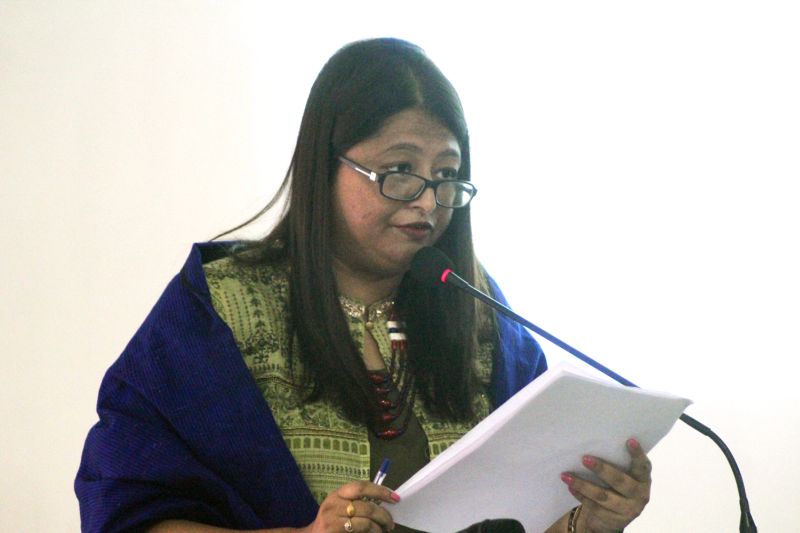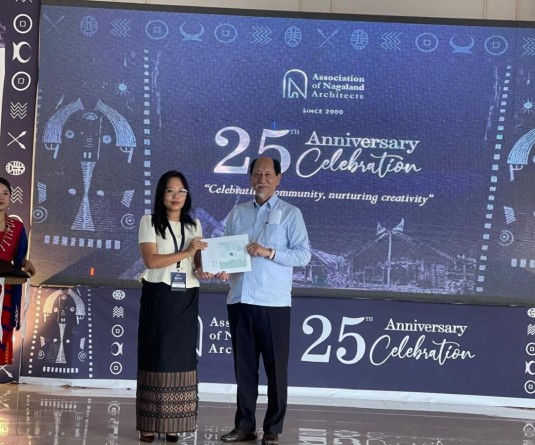Regional Symposium deliberates ‘CAB- Impact on North East India’

Afrida Hussain, Founder & Editor-in-Chief, Inside NE addressing the Regional Symposium on “Citizenship Amendment Bill – Impact on North East India” held at Dimapur Government College on September 21. (Photo Courtesy: DGC)
Dimapur, September 21 (MExN): A Regional Symposium on “Citizenship Amendment Bill – Impact on North East India” was held at Dimapur Government College with Temjen Toy, IAS, Chief Secretary, Government of Nagaland as special guest and Afrida Hussain, Founder & Editor-in-Chief, Inside NE, as resource person.
The Publicity & Media Cell of DGC in a press release stated that delivering the keynote address, Temjen Toy touched upon the issues, concerns and challenges related to CAB. Adding that citizenship is not for the State to decide, he dwelt on the nuances on how CAB may affect the indigenous people of Nagaland as well as the other North East States.
Afrida Hussain gave an in-depth presentation beginning with the Citizenship Act of 1955. The concerns over the rights of the indigenous people were prominently highlighted, substantiated through the voices of some Chief Ministers of the States of North East India. Dwelling on the idea of citizenship, she added that the CAB undermines National Register of Citizens (NRC) and therefore, the Assam Accord. She raised questions on this proposed exercise in the context of India being a secular and democratic country.
The presentation was followed by discussion moderated by Dr. Maongsangba, Associate Professor, Political Science, which shaped the recommendations of the symposium. Afterwards, a report on the recommendations of the symposium was heard from the rapporteurs, Dr. Asangba Tzudir, Assistant Professor in Philosophy, and Dr. Yelhi Vero, Assistant Professor in Economics.
The Symposium was followed by the inauguration of the “Friendship Park” by the special guest. The Park was built under the aegis of DGC RUSA Monitoring Cell.
Based on the deliberations of the Symposium, the following recommendations were made further study and deliberations:
• How would the Central Government deal with the issue of ‘stateless people’, numbering 19,06,657? This exercise involved 50,000 people, lasting some 7 years and costing close to 1.5 billion rupees. Taking from the Irish Political Scientist Benedict Anderson, will they be reduced to the status of ‘Imagined Communities’? What will be their basic rights as Political Humans?
• In the context of Nagaland, though a detention camp is being built in Assam, the state govt has been requested to enforce ILP in the district of Dimapur. A territorial issue relating to Naga Hills districts is at stake here which goes beyond the scope and provisions under Article 371A.
• The concept of “We the People” as enshrined in the Indian Constitution must be taken in letter and spirit while handling the core issues of the bill in order to protect the right of the indigenous people. The political parties, civil societies and the government need to come together to protect the rights and identity of the people of the region, so also the economic implications on the people.
• While 200 more Foreign Tribunals are to be added to the existing 200 in order to deal with appeals, how are the states in the North East prepared to deal legally through District Legal Services Authorities?
• Drawing a parallel to CAB, the present exercise of RIIN - Register of Indigenous Inhabitants of Nagaland, the concept and understanding of ‘Indigenous’ or indigeneity seems to be located within the context of the State which itself will create ‘epistemic violence’ over the very understanding of indigenous peoples’ rights, historicity and culture. Therefore, indigenous people the world over will closely observe the developments in relation to the exercise of Register of Indigenous Inhabitants of Nagaland. • Can the Centre assure in written that indigenous rights will be protected even though Central Home Minister Amit Shah has assured that it will not affect the indigenous rights of North East Communities?
• CAB being perceived to be based on the grounds of religion, the Government of India needs to take the issue of religious persecution in those countries to the UN.
• To implement CAB, it will be better and more appropriate for India to be free of religious persecution.
• Considering the impact of CAB on the rights of people affected by CAB, it is time for right thinking citizens to voice their reasoned concerns.
• However and finally, the approach towards the controversial CAB needs to be set within a secular and democratic frame in consideration of the rights of the people.




